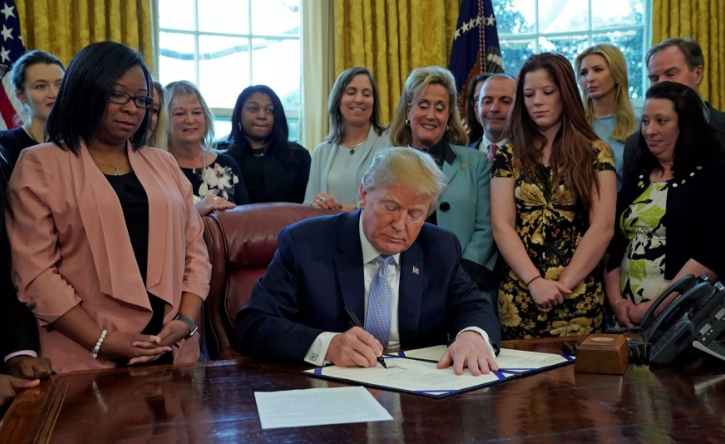Students React to Sex Trafficking Bill
On April 11, President Trump signed into law the Allow States and Victims to Fight Online Sex Trafficking Act, or “FOSTA.” This bill was introduced by Missouri Rep. Ann Wagner, and passed the House in February, and passed in the Senate with a vote of 97-2.
The law’s intent is to hold websites such as Backpage, a website that was recently found guilty of being involved in creating the ads that aided sexual trafficking on its website, accountable for the sex-trafficking ads that are posted online. Websites like these are often the main places where victims are trafficked, through the use of online ads. The law will make it easier for victims and attorneys to file suits against the websites themselves. In the wake of the signing, sites such as these have begun to take down their classified ad sections, and have cut down on accepting advertisements relating to sexual content.
The bill had widespread bipartisan support, as shown by its passing with a huge margin. However, it is not without controversy.
Advocates for sex workers have spoken out against the bill, saying that it will create a more unstable and unsafe environment for sex workers. They argue that without sites such as Backpage or Craigslist, it is harder for sex workers to screen customers, and to safely post ads, instead having to resort to older, more dangerous methods of work. They also believe that it will make it harder for United States law enforcement to track those involved in sex trafficking. In an interview with the New York Times, Jean Bruggeman, executive director of an anti-trafficking advocate coalition, said, “Shutting down every service provider and website will not end sex trafficking. What it will do is push traffickers to overseas websites that are beyond the reach of law enforcement, making it harder to prosecute them.”
Other arguments against this bill is that it is a step backwards for internet freedom. Opponents of the bill, including one of the two senators that voted against it, said that the bill infringed on the protections that websites were given under the Communications Decency Act. Before FOSTA was signed into law, users only, not the websites themselves, were held accountable for the things they posted. This allowed websites to claim ignorance of any illegal or harmful posts made on its website. However, regardless of the differing opinions, it seems that the current legislative body in Washington sees this as a beneficial bill. Ohio Senator Rob Portman was one of the main Senate sponsors of the bill.
“This is a big victory for trafficking victims and survivors,” Portman said; “who for too long have been denied the opportunity to get the justice they deserve.”
The authors of the bill have spoken out against the criticism, saying that this bill was drafted with care and careful investigation, and is the best option to fight the current issue of sex trafficking in the country. Wagner herself said that the bill was guided by members of the Justice Department and from prosecutors. In response to the worries that innocent website providers would be negatively affected, she said that the law should not affect those that are not knowingly violating criminal laws.
President of the College Democrats and SGA Senator Robbie Lasky, said that he believes that the bill will have a positive impact, and that hopefully the arguments against the bill will remain hypothetical.
“While I understand there is definitely concern, and that we need to have protections in place for sex workers, if my knowledge of the bill is correct, then this bill just holds websites accountable for advertisements,” said Lasky. “I think with the potential to prevent the advertising of sex trafficking and non-consensual sexual acts, we’re talking about saving lives.”
With polarization plaguing the government, it is uncommon to see something have such widespread support from both sides, and seems like a positive direction for our leaders to move in.
“I think that it is good in general that we have such widespread unanimous agreement that we need to stand together against things like this,” said Lasky. “I think that this is a pretty common-sense bill, and I think it is good that people are sticking together and saying this is something we want to work on and something we have the power to fight against.”
Freshman Lyndsey Barillier, a member of the Diversity and Global Citizenship learning community, agreed, saying “It’s a great bill that obviously has strong bipartisan ties.”
Your donation will support the student journalists of Saint Louis University.




